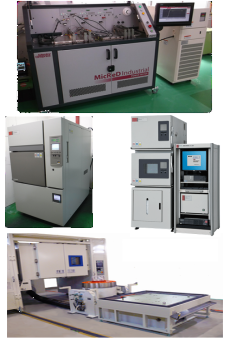Reliability Tests for Power Devices Launched
In the automotive industry where the market is rapidly expanding in recent years, development of EV/PHEV vehicles is intensifying., and further energy saving such as minimizing the electric drive system in the vehicle and reduction of CO2 emissions is required.
Power device is the key to reducing transmission loss of inverters and motors, and to their miniaturization. Its demand has been rising continuously. Thus, the requirements of the power device materials are getting more severe, not only conventional material of Si-based IGBTs but also next-generation materials of SiC-based and GaN-based modules.
Chemitox recently installed facilities for Reliability Test for Power Devices and launched the services. Some of these facilities are located in Tokyo, which is easily accessible by public transport so please feel free to visit our company to observe the tests.
Power Cycle Test / Transient Thermal Resistance Test (T3Ster)
The transient thermal resistance measurement mechanism (T3Ster) can detects failure phenomenon non-destructively, for example, failure in structures around semiconductor chip, in joint structures of chip – substrate -metal base plate, and cracks in joint structure of solder - AI wire.
Thermal Cycle Test (Thermal shock test)
Durability of whole power device can be evaluated, including sealing resin, bonding materials, solder cracks, package cracks, and Al slides as well as cracks around semiconductor chip.
Temperature Humidity Bias Test (High voltage migration test)
This test detects failure phenomenon such as TDDB (Time-Dependent Dielectric Breakdown) of insulating film and electrolytic corrosion of metal film by measuring effects of electric field or moisture condition on increase of insulation leakage current, gate leakage current, breakdown of gate insulation film, and ion migration between wirings.
Vibration Environmental Test
Al wire breakage and package cracks in 3-axis direction can be evaluated, with specified vibration test conditions under actual use environment.

Reliability Tests for Power Devices: Contents
・ Reliability Tests for Power Devices
・ Power
Cycle Test / Thermal Transient Test (T3Ster)
・ Thermal
Cycle Test (Thermal shock test)
・ Temperature
Humidity Bias Test (High voltage migration test)
・
Vibration Environment Test
Contact information
PIC: Tomoki Sumida (Mr.)
TEL:+81-3-3727-7111

